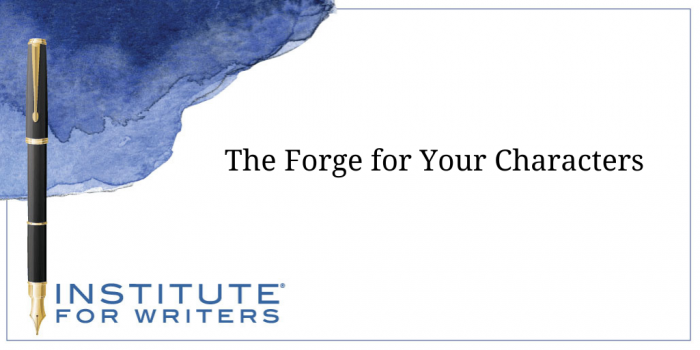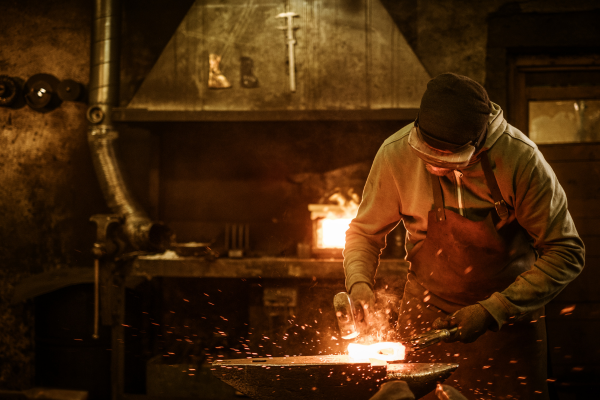1000 N. West Street #1200, Wilmington, DE 19801
© 2024 Direct Learning Systems, Inc. All rights reserved.

The literary term for life experiences is backstory. This is your character’s origin story. Why is it important to have one?
Because everything that has happened to your character up until the moment the story begins has given him or her the knowledge and skills they’ll need to achieve their goal. What they know and what they’ve learned will help them. Or, if it’s a traumatic experience that has left an emotional scar, it will hinder them, and they must overcome it to reach their goal.
Characters don’t leap from your head fully-formed the way Athena sprang from the mind of Zeus. You must create them by thoughtfully and carefully mixing their ingredients, then shoving them into the forge of life experiences and cranking up the heat.
I do all my character work before I type “Chapter One.” I begin with discovering my characters’ names. I can’t even write the synopsis with fill-it-in-later blanks where names belong. I’ve tried. Can’t. Drives me bananas.
There are tons of sites online for researching first and last names, by gender and ethnicity. Names can serve as quick identifiers for secondary characters. Examples from two of my novels: In Nightwing, a vampire story, the heroine’s friend and neighbor is Frank Chou. Chou is the second most popular surname in China, so I don’t need to tell you Frank is Chinese. In The Dreaming Pool, a paranormal romantic suspense, the heroine is clairvoyant. Her first name is Eslin, which means dreamer in Gaelic.
It isn’t mandatory that names be symbolic or convey a message, but if you find a name you like, or can make up one that does, aces. George Lucas should win an award for Luke Skywalker. A few other epiphanous names: Ebenezer Scrooge, Sherlock Holmes, Alice, Buzz Lightyear, Dorothy Gale. And because I love Rocky and Bullwinkle, Snidely Whiplash. I keep a notebook on my desk to record cool names I run across.
 What’s their profile?
What’s their profile?Once I have my character’s name, I start his or her profile. If you use a detailed character worksheet, you’ll have a good portion of your character’s backstory there, though I usually end up writing another couple of pages, which I title “Bio” and attach to the worksheet. Detailed paragraphs about defining moments or incidents, but usually just notes and ideas that come to me while I’m framing the story.
A note about using Zodiac signs to create characters. Each sign is associated with one of the four elements: earth, wind, fire and water. Aries, for example, is a fire sign. Libra is an air sign. That’s a good foundation for constructing personality.
Write down everything that comes to you about the character, no matter how squirrely it seems. A snippet of conversation, a setting, a descriptive note. You may not use it, but if you record it, it will be in your head as you’re writing, and it will, trust me, pop out of your subconscious like a flash card if you hit a spot in the story where it just might fit.
You’re feeling faint again; I can tell. You have pages of worksheets and bios that add up to a meticulous backstory for each of your characters, and you’re wondering, “How am I ever going to cram all this into the story?”
I have good news and bad news about that—you aren’t going to cram it in, not all of it.
Stephen King says: “The most important things to remember about backstory are a) everyone has a history and b) most of it isn’t very interesting. Stick to the parts that are, but don’t get carried away with the rest.”
Now you’re peeved. I can hear you grumbling, “If I’m not going to use all this stuff, why did I bother to write it down?”
Here’s why: So your subconscious can make those flashcards you’re going to thank the writing gods for later.
You don’t want to cram anything into a story, least of all your character’s backstory. You want to weave it in through the character’s point of view—a little here, a little there—in narrative, introspection and dialogue.
Backstory—aka life experiences—is the ingredient that locks in your character’s personality traits. The Internet is chock full of personality tests, articles on the different types of personalities, and lists of positive and negative personality traits. I’ve listed links to the best ones I found at the end of this post.
When you create a personality for your character, begin with yourself. Here are six questions I found in the article Examples of Personality Traits at Your Dictionary. Answer them as you, then as your character.
How would I describe myself?
What brought me joy as a child?
What brings me joy now?
What’s my biggest accomplishment?
What’s my biggest dream?
What’s my biggest fear?
Your character’s personality influences his view of the world. Here are two examples of description, the first written in the point of view of Evelyn, she of the Olive Oyl feet, who sees the glass as half-full, and her significant other, Henry, who sees the glass as half-empty:
Evelyn loved the soaring oak tree. The cool shade beneath its broad limbs in summer, even on the hottest days, the butterscotch yellow of its leaves in fall, the pencil sketch starkness of its bare branches in winter.
Henry glared at the monster oak. Already he could feel blisters on his thumbs from the days he’d spend this fall raking up the thousands of leaves the damn thing would drop. He prayed it would be struck by lightning.
Another thing to consider is how your main character’s personality meshes or clashes with the personalities of the other characters in the story. You might find some interesting fodder for internal conflicts in the dynamic between your characters.
When you remove them from the forge what will you see?
Flaws and imperfections. We all have them. Life kicks us around, and it leaves bruises: broken hearts, insecurities, shattered dreams. These emotional scars will become your character’s internal conflicts.
Your main character’s personality and backstory will impact the challenges that he or she must overcome to achieve their goal. And that’s what we’ll talk about next time.
Lynne Smith, aka Lynn Michaels, is the author of two novellas and sixteen novels, three of which were nominated for the Romance Writers of America’s RITA award, the Oscar of romance writing. She won two awards from Romantic Times Magazine, for best romantic suspense and best contemporary romance. Her only complaint about writing is that it really cuts into her reading time. She lives in Missouri with her husband, two sons, three grandsons, and one granddaughter, born on Lynne’s birthday. Lynne is also an IFW instructor. She teaches “Breaking into Print” and “Shape, Write and Sell Your Novel.”
1000 N. West Street #1200, Wilmington, DE 19801
© 2024 Direct Learning Systems, Inc. All rights reserved.
1000 N. West Street #1200, Wilmington, DE 19801
© 2024 Direct Learning Systems, Inc. All rights reserved.
1000 N. West Street #1200, Wilmington, DE 19801
© 2024 Direct Learning Systems, Inc. All rights reserved.